George Floyd. Breonna Taylor. Sandra Bland. Tony Robinson. The exhaustion that comes from being forced to recite that list over and over again, each time with an added name, is nothing in comparison to the exhaustion that comes from bearing the weight of knowing we lost another life to the systems of white supremacy and racism in this country. For BIPOC folx, this weight is increased exponentially. We cannot simply turn off the news and momentarily forget or ignore the institutions that have oppressed our people for hundreds of years — we have to bear the consequences of a system that has gone unchecked for too long. We have to demand justice and change in ways that non-BIPOC folx will never understand.
On Aug. 28, 2020, a group of students decided to honor those who have fought and advocated for BIPOC folx by holding a march in solidarity with the March on Washington — aptly titled the “March on Madison.” The morning of the event, organizers received an email from UW-Madison administrators under the guise that they were “assisting them with understanding the parameters for a successful and safe protest or demonstration.” Considering their absence at other events earlier in the summer, we quickly concluded that this was a result of the march’s starting location on UW property — the beloved Camp Randall — and not the majority student attendance. The city of Madison and the University’s administration seemed to be using the same playbook, for they were more concerned with protecting property than they were with protecting their community.
Included in the message was a “Protest Card” that listed guidelines that, should organizers fail to follow, may result in “conduct action and/or arrest.” The friendly tone of the email did not mask the malice behind its intent and we, as organizers, understood what we were being threatened with — “comply by our rules or face consequences.” To us, it became glaringly clear that the University was willing to go out of its way to ensure that BIPOC student activism on campus did not disrupt the comfortability of the majority. Anything to keep white donors happy, right?
The day following the March on Madison, the same group of students collaborated with other Madison organizers and mobilized a second march demanding justice for Jacob Blake. This march, much like the first, was met with high turnout and media attention. Everyone began asking us who we were, what organization we were a part of and for lack of a better answer, we kept shrugging and replying with “we’re just students.” In the following days, though, we realized we as “just students” managed to not only make those in an established institution fear our collective voice and power, but continuously encouraged large turnout at events centered around BIPOC concerns. As a result, we decided to refocus our efforts and utilize our newfound collective voice to fight for BIPOC folx on campus and in the greater Madison area by standing up against local injustices.
The UW-Madison BIPOC Coalition formed under the shared notion that all BIPOC voices are important; because our goal is to demand equal justice for all marginalized groups on campus, we embody this understanding in all facets of our organization. We reject the white supremacist, patriarchal system of power and its notions of hierarchy and, as a result, do not have traditional positions like “President,” “Vice President,” etc. Instead, we work in a shared governance model where each voice holds as much power as the next. Our name embodies our mission; we aim to coalesce a community of BIPOC leaders who will fight to ensure that all BIPOC students feel heard, respected, and welcome on this campus. We are an organization of students, not a student organization — we work in tandem with different Registered Student Organizations (RSOs) on campus but we will remain independent from the University’s structure allowing us to fight for justice without having to worry about being held to specific University protocols.
One thing our organization has become known for is our list of demands to the University. We want to stress that these demands are NOT new to administration, rather they are a compilation of demands that have been repeated by BIPOC students for years. We chose to champion these specific demands because we want to not only demonstrate how little the University has actually done to create a welcoming space for BIPOC folx, but to also acknowledge and continue the work of students before us. Each time BIPOC student leaders speak out against injustices on campus, we are exploited by the University and expected to do their job for no compensation, all under the guise that it will help future students. Once they have worked us to the point of exhaustion — or complete and total loss of faith in the system — they shuffle us out through graduation, dismiss our work and wait for the next round of students to repeat the process. We, as the BIPOC Coalition, say no more.
You can shuffle us around, attempt to dismantle our efforts and organizations by funneling us through action groups, you — Chancellor Blank — can even attempt to ignore us, but we will not be silenced any longer. To all the BIPOC students on campus: we see you, we hear you and we will continue to fight with you.
Demands:
- Remove the Abraham Lincoln monument located at the top of Bascom Hill and replace it with someone who stands for the justice of all people.
- Remove the Chamberlain Rock, formally known as “N*****head Rock,” located on Observatory drive.
- Enact a “Moral Restart”— not a “Smart Restart.”
- Defund and subsequently abolish the University of Wisconsin Police Department.
- Reopen discussion on how the University can meet the 1969 / 2020 demands with student groups such as the Student Inclusion Coalition and the Wisconsin Black Student Union.
- Recognize the educational value of marginalized identity-based student affinity groups.
- Implement a permanent funding structure for the student organizations that primarily serve and include predominantly marginalized groups, with funding allocated through the Vice Chancellor of Student Affairs or Deputy Vice Chancellor for Diversity and Inclusion.
- Improve the support system for marginalized students on campus.
- Create a coordinated infrastructure to respond to acts of structural oppression.
- Further action from Chancellor Rebecca Blank regarding the meetings between leaders and the general body of the Wisconsin Black Student Union regarding their experiences and recommendations in making this a truly diverse and inclusive campus.

Cardinal View: UW Administration Sabotages the Wisconsin Idea
The Wisconsin Idea has come under attack by the people who are meant to uphold it. The Idea, which states “that education should influence people’s lives beyond the boundaries of the classroom,” has been overrun and overruled by the University of Wisconsin-Madison’s top administrators today due to their lack of care and empathy towards marginalized communities on campus.
In our classrooms, we — as students — are taught to think outside of the box, to understand people around us who do not share our same identity and to intelligently fight for what we believe in.
Over the course of this summer and semester, we have seen that the UW Administration does not truly value the Wisconsin Idea; they have refused to meet with BIPOC-led student groups and listen to their demands time-and-time again. If the Wisconsin Idea does signify the University’s commitment to public service, then it is their duty to serve all members of this community — this entails listening to BIPOC students and student organizations. By ignoring these crucial voices, the University’s administration blatantly disregards its very mission.
The neglect of any student-led demands by administration has become even more apparent as the official University of Wisconsin Police Department was caught on Twitter attacking the Chair of ASM for his personal beliefs, resorting to using juvenile hashtags such as #mixedmessages and ignoring ASM’s pleas for a better structured police department. Due to this lack of open ears on the University’s part, ASM was forced to have a vote of no confidence against the UWPD.
Instead of empowering students to voice their opinions and act on them to make their community better — or in the University’s own words, “beyond the boundaries of the classroom” — University institutions are shutting students down and not focusing on their wants and needs.
Former UW President Charles Van Hise first championed The Wisconsin Idea in 1905, and stated that he “shall never be content until the beneficent influence of the University reaches every family of the state.”
However, these actions by the UW System administration have proved that the University will not be “content” until the University’s “beneficent influence” has reached every white family in the state. Meanwhile, they are complacent and cynical as students of color struggle to feel that benefit every day on campus. Must we as students really sit back and watch as our University leaders — the very leaders who have structured our higher education and molded our minds into ideas that they hold sacred — repeatedly ignore the demands of BIPOC groups who already feel silenced on campus?
UW–Madison has failed its students this semester. They have continually failed BIPOC students every semester. The University continues to enable and actively support a culture of oppression by repeatedly denying BIPOC folx a chance to be heard.
For this reason, it is imperative that the University’s top officials stop shying away from hard conversations with their student body and with student organizations. The University must not only meet with and talk to, but listen to the BIPOC Coalition. Take their demands to make the University more accepting to students of color and marginalized groups on campus seriously. By claiming to not have enough time to meet with these groups of students, the University is continuing a cycle of aggression and institutionalized oppression towards Black, Indigenous and People of Color.
— The Daily Cardinal Editorial Board






